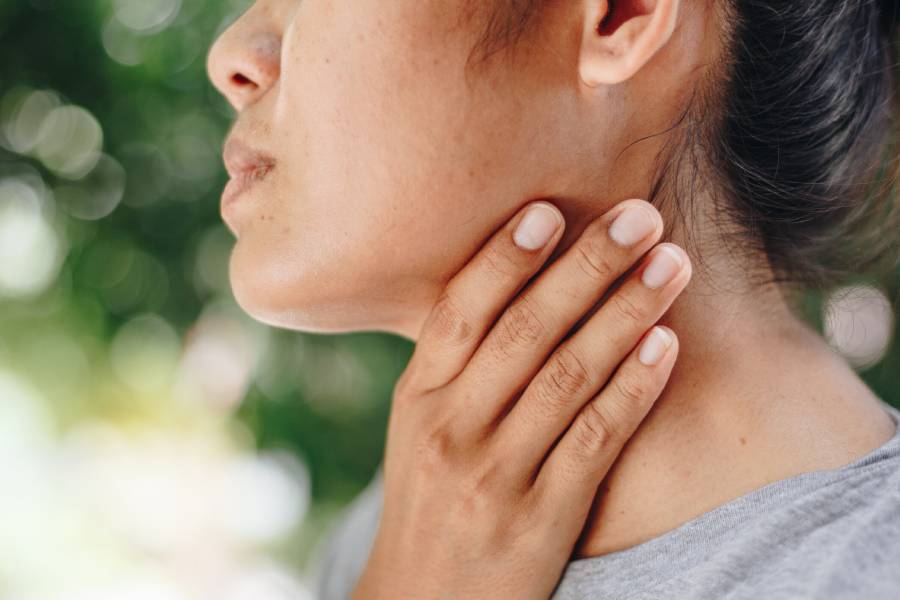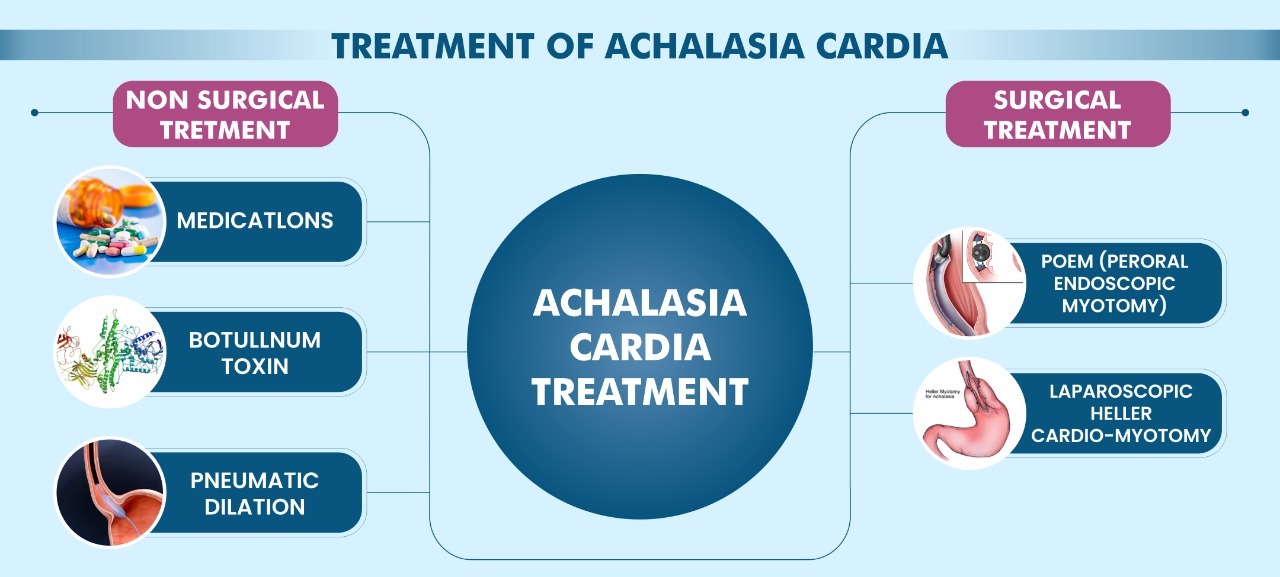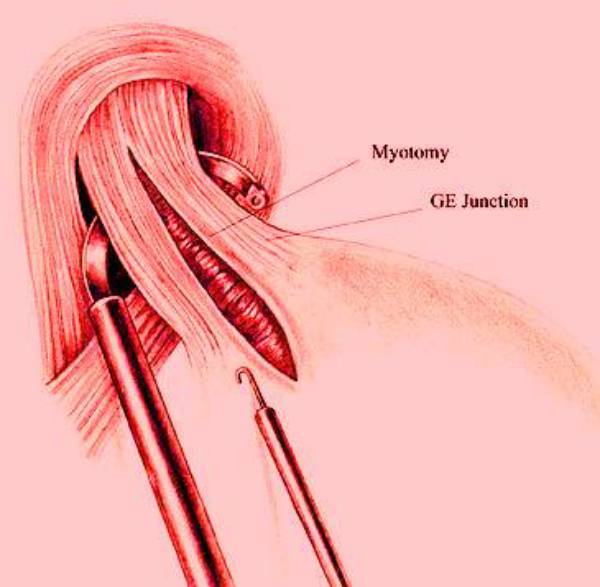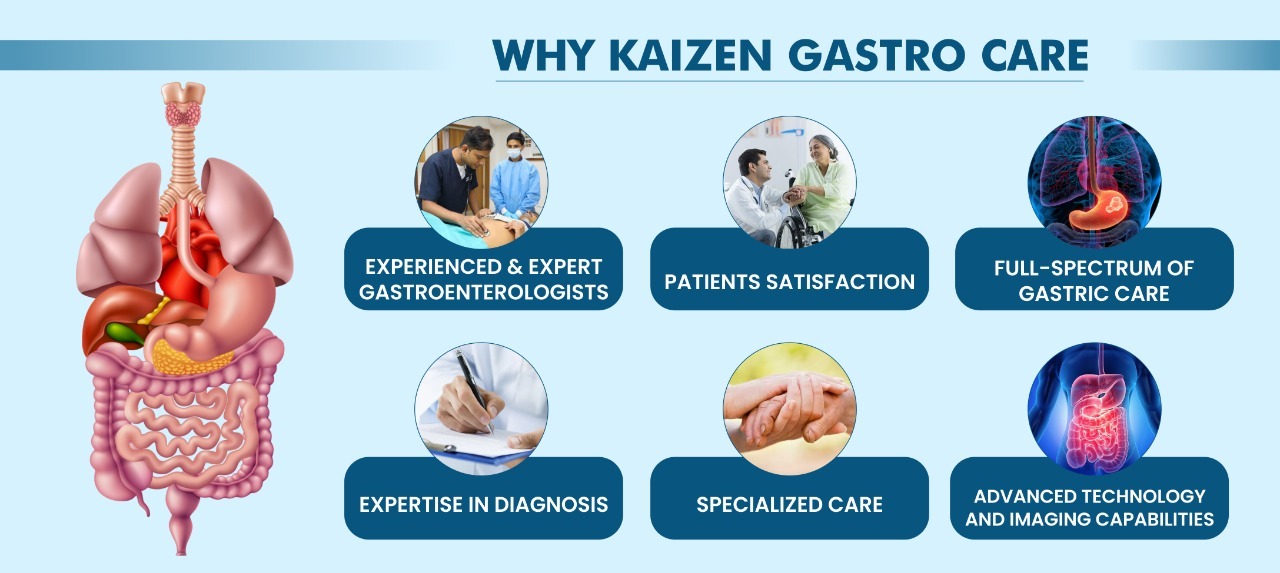- 09763635252 Call Us Now
- appointment@kaizengastrocare.com Email Us
- Home
- About Us
- GI Services
- GI Surgeries
- GI Cancer
- GI Motility
- Diet for Gut
- Patient Care
- Contact Us
Achalasia
Achalasia Cardia Treatment in Pune
“Achalasia-Cardia” is a rare disease, but the number of patients diagnosed with Achalasia-Cardia is increasing day by day. In achalasia, “A” stands for “no,” and “Chalasia” refers to the relaxation of the lower esophageal sphincter (LES). Achalasia, also known as Achalasia Cardia, is a condition in which the esophagus, the tube that carries food from the mouth to the stomach, is unable to move food into the stomach. The lower esophageal sphincter(LES) is a ring of muscle fibers that surrounds the lower end of the esophagus where it joins the stomach and acts as a valve to control the backflow of food. In individuals with achalasia, the LES fails to relax during swallowing, causing food to be stuck up in the esophagus.

Over the past year, Kaizen Gastro Care experts have treated more than 100 patients suffering from Achalasia-Cardia, indicating a significant number of patients with Achalasia-Cardia disease. Kaizen Gastro Care offers advanced and comprehensive treatment and management for the Achalasia-Cardia condition. What sets Kaizen Gastro Care apart is that both expert endoscopists, Dr. Vikrant Kale and advanced laparoscopic surgeon Dr. Samrat Jankar, who specialize in endoscopy and laparoscopy, work under one roof, minimizing any bias towards a particular procedure. Kaizen Gastro Care is renowned as the best center for achalasia treatment in Pune.
On this page, Dr. Vikrant Kale and Dr. Samrat Jankar share information about the development, problems, and treatment options for Achalasia-Cardia.
To understand what happens in Achalasia Cardia, let us first understand the normal process of swallowing.
Normal swallowing:
Normal swallowing involves rhythmic contractions of the muscles in the food pipe, also known as peristalsis, which pushes food down the food pipe. Additionally, the Lower Esophageal Sphincter (LES) valve located at the lower end of the food pipe relaxes and opens to allow food to pass into the stomach. Once the food reaches the stomach, the LES valve closes tightly, controlling the reflux of food and acid from the stomach back into the food pipe. This proper functioning of the LES valve is important to control acid reflux, which can induce ulcers in the food pipe and lead to heartburn.
Know more about Achalasia Cardia from Experts:
What are the symptoms of Achalasia-Cardia?
The most common sign of achalasia is difficulty swallowing. Also, the Patient can experience Other symptoms that may include:
- Difficulty in swallowing food or even water
- The sensation of food stuck up in the chest.
- Regurgitation of undigested food from mouth and nose
- Noncardiac chest pain
- Gradual weight loss.
- Some may face pneumonia and
- You can also face vomiting.
How did Kaizen Gastro Care diagnose Achalasia-Cardia?
Achalasia can sometimes be misdiagnosed in its early stages, as its symptoms can be like other digestive disorders. The initial tests for patients complaining of swallowing problems usually include an endoscopy and barium study. If you visit Kaizen Gastro Care in Wakad for these symptoms, our experts, Dr. Vikrant Kale and Dr. Samart Jankar may recommend further tests to confirm the diagnosis of Achalasia-Cardia, such as:
- Upper endoscopy: This test can help rule out malignant lesions and assess for achalasia. Dr. Vikrant Kale at Kaizen Gastro Care will insert a thin, flexible tube equipped with a light and camera (endoscope) down your throat to examine the inside of your esophagus and stomach. Endoscopy can also be used to identify any partial blockage of the esophagus if your symptoms or barium study results suggest that possibility.
- Barium study: A barium swallow is another useful investigation, during which you swallow a solution containing barium. X-rays are then taken to ensure the non-relaxation of the achalasia cardia.
- Oesophageal manometry: This test can confirm the diagnosis of achalasia. At Kaizen Gastro Care, Dr. Rupali Bandgar, an expert gastro physiologist, performs Esophageal High-resolution Manometry, in which a thin probe is passed through the esophagus to assess the peristalsis and lower esophageal sphincter relaxation during swallowing. Kaizen Gastro Care is a renowned center for esophageal manometry, where Dr. Rupali Bandgar not only confirms the diagnosis of achalasia cardia but also interprets the type of achalasia, which is crucial in determining the treatment plan.
Best Achalasia-Cardia Treatment at the Kaizen Gastro Care, Pune:

At Kaizen Gastro Care, the team of best gastroenterologists in Pune, including Dr. Vikrant Kale, a renowned endoscopic surgeon for POEM procedure, and Dr. Samart Jankar, an expert laparoscopic surgeon for laparoscopic Heller’s cardiomyotomy, plan patient-centric treatment for achalasia. The treatment plan takes into consideration different factors such as age, health conditions, type of achalasia, and severity of the disease, ensuring that it is tailored to each patient for the most effective results.
The core principle of achalasia cardia treatment:
It’s essential to note that none of the treatments available can stop or change the underlying loss of nerve cells in the esophagus, nor restore normal peristaltic contractions in the food pipe of patients with achalasia.
The principle of achalasia cardia treatment generally involves two main steps.
- The first step is to divide the muscles of the lower esophageal sphincter (LES) to ease the signs of achalasia, which include difficulty swallowing and regurgitation of food
- The second step involves executing anti-reflux measures at the end of the process to prevent the reflux of stomach contents into the esophagus after myotomy. This is done to decrease the risk of gastroesophageal reflux disease (GERD) which can occur as a result of the weakened LES after myotomy. These anti-reflux measures may include additional surgical steps to reinforce the LES or techniques to create an anti-reflux barrier, relying on the surgeon’s choice and the patient’s condition.
By dividing the muscles of the LES to ease achalasia signs and implementing anti-reflux measures, the overall goal of achalasia treatment in Pune is to restore regular swallowing function while minimizing the risk of post-procedure reflux.
Nonsurgical Treatment Options for Achalasia Cardia at Kaizen Gastro Care:
At Kaizen Gastro Care, one of the best centers for achalasia treatment in Pune, non-surgical options such as medication, endoscopic botox injection, and endoscopic pneumatic dilation are available but reserved for patients who are considered high-risk or unfit for surgery. It’s essential to note that non-surgical treatment has its limits in terms of potentially poor results and the need for multiple sessions. The team at Kaizen Gastro Care carefully considers each patient’s situation and determines the most appropriate treatment method to ensure the best potential outcomes.
- Medication: Medications such as muscle relaxants and nifedipine or isosorbide are sometimes used to treat achalasia-cardia symptoms. Medication will have a very short duration of relief so not advised in day-to-day clinical practice.
- Botulinum Toxin (Botox) Injection: Injection of botulinum toxin into muscles causes temporary paralysis of the specific muscle, which stays for months to over one year. It’s a temporary treatment, associated with its own set of difficulties so this treatment is typically reserved for those who cannot undergo surgery or have a poor prognosis, or have a short life span.
- Balloon dilatation of Achalasia: A balloon dilation procedure involves placing a balloon into the esophagus and expanding it to widen the opening of the lower esophageal sphincter (LES). However, nowadays this procedure is considered obsolete, with only a few doctors still performing it. This is because it often requires multiple sessions to provide relief of signs and carries a higher risk of complications such as esophageal perforation.
Surgical treatment options for achalasia cardia at kaizen gastro care – the best center for achalasia cardia treatment in Pune, Maharashtra:
Surgery is considered a more effective treatment for achalasia cardia with good long-term results. During surgery, the muscles of the lower esophageal sphincter (LES) valve are systematically divided under direct visualization to keep the valve open, permitting better passage of food and fluids via the esophagus. At Kaizen Gastro Care, surgical options for achalasia cardia may include laparoscopic myotomy (laparoscopic Heller’s cardiomyotomy) and endoscopic surgery (POEM procedure).
Endoscopic surgery: Preoral endoscopic myotomy (POEM)
Dr. Vikrant Kale is the best Endoscopist in Pune at Kaizen Gastro Care and he completed his Fellowship In Upper & Lower GI Endoscopy in the year 2018 from Oxford University (UK). In his experience, He has done around 3200 gastroscopies, 2000 colonoscopies, and 700 ERCPs until now. He is well-known for performing the POEM (Peroral Endoscopic Myotomy) procedure to treat Achalasia Cardia. Using an endoscope inserted through the mouth and down the throat, Dr. Kale creates an incision in the inner lining of the esophagus, similar to a Heller myotomy. This allows for the cutting of the muscle at the lower end of the esophageal sphincter, providing relief from swallowing difficulties.

However, one potential limitation of POEM is that it does not include an anti-reflux procedure such as fundoplication, which can improve the chances of postoperative acid reflux. Studies have shown that approximately 40-60% of patients who undergo POEM may develop GERD (gastroesophageal reflux disease) after the procedure. In such cases, daily oral medication for acid reflux may be required for an extended period.
Despite this limitation, POEM has shown to be highly effective in improving swallowing function, with results comparable to laparoscopic surgery. Dr. Vikrant Kale’s expertise in performing POEM at Kaizen Gastro Care in Pune makes him a top choice for patients seeking minimally invasive treatment for Achalasia Cardia. Proper evaluation and management of GERD after POEM can help assure optimal postoperative outcomes for patients.
Laparoscopic Heller myotomy (LHM):
Dr. Samrat Jankar, a renowned Laparoscopic Surgeon & Achalasia Cardia surgeon in Pune, specializes in performing a Laparoscopic Heller myotomy (LHM) procedure to effectively treat Achalasia Cardia disease. During the procedure, Dr. Jankar carefully cuts the muscle at the lower end of the esophageal sphincter, allowing food to pass more easily into the stomach. This is done using minimally invasive keyhole surgery (Laparoscopic Heller Myotomy) which reduces the risks and promotes faster recovery. To prevent future issues with gastroesophageal reflux disease (GERD), Dr. Jankar also performs a process called fundoplication at the same time as the Heller myotomy. During fundoplication, the top of the stomach is wrapped around the lower esophagus, creating an anti-reflux valve that prevents acid from flowing back into the esophagus. This helps to control GERD and its associated symptoms. Fundoplication is typically performed using minimally invasive laparoscopic techniques, which further enhances patient recovery and reduces postoperative discomfort. With Dr. Samrat Jankar’s expertise in Laparoscopic Heller myotomy and fundoplication, patients with Achalasia Cardia can receive comprehensive and advanced surgical treatment for their condition at Kaizen Gastro Care in Pune.

Achalasia Cardia follow-up:
Since none of the treatments for achalasia remedy the underlying disease, and because there has a higher chance of developing esophagus cancer, routine follow-up is needed. The goal is to recognize and treat recurrent symptoms or complications, especially GERD. Our Specialists Dr. Vikrant Kale and Dr. Samrat Jankar especially give priority to regular follow-up with patients because Kaizen Gastro Care has the main motto to not only treat the patient but completely cure the patients. Regular follow-up help to completely cured diseases.
Postoperative Care after Achalasia Cardia Surgery:
Postoperative care after Achalasia Cardia surgery is a critical component of the treatment plan at Kaizen Gastro Care, a leading center for Achalasia treatment in Pune, India. The following are some general approaches for postoperative care:
- Diet and Nutrition: Your surgeon will provide specific instructions regarding your diet after surgery. In the initial postoperative period, you may be on a liquid or soft diet to allow for the healing of the surgical site. Gradually, you may progress to a normal diet as tolerated. It’s important to follow the dietary guidelines provided by your surgeon to avoid any issues with swallowing or reflux.
- Pain Management: Pain at the surgical site is common after surgery. Your surgeon may specify pain medicines to assist manage discomfort.
- Activity and Rest: Satisfactory rest is important for the healing process. However, earlier mobilization and walking are enabled to prevent blood clots and promote overall recovery.
- Incision Care: If you had laparoscopic surgery, you may have small incisions that require proper care.
- Follow-up appointments: Regular follow-up appointments with your surgeon are important to observe your progress and assure proper healing.
- Medications: You may be prescribed medicines for acid reflux or antiemetic medicines.
- Monitoring for complications: Patients should be aware of potential complications, such as bleeding, infection, or difficulty swallowing, and should seek medical attention instantly if they undergo any of these signs.
- Lifestyle changes: Patients may be advised to make certain lifestyle modifications, such as avoiding spicy foods, stopping smoking, and losing weight, to help manage signs and control the recurrence of the condition.
How much does the achalasia-cardia treatment cost in Pune?
The cost of achalasia-cardia treatment in Pune ranges from Rs. 1,25,000 to Rs. 3,00,000 (Rupees one lakh twenty-five thousand to Rupees three lakh). The cost of achalasia-cardia treatment in India varies based on the private facilities in each city.
Several factors determine the cost: the patient’s condition, the room chosen for the hospital stay, corporate schemes like EHS (Employees’ Health Scheme), CGHS (Central Government Health Scheme, Employees’ State Insurance, or cashless medical insurance coverage. However, the cost of achalasia-cardia surgery and total medical stay in Pune is only about a quarter of what you would pay in a Western country.
Why choose Kaizen Gastro Care for your Achalasia cardia treatment?

- Experienced gastroenterologist Team: Dr. Vikrant Kale and Dr. Samart Jankar is the experienced gastroenterologist and Gastro-intestinal surgeon in the Pune and PCMC area who provides the best care for all gastric and esophageal diseases.
- Advanced diagnosis and treatment: Kaizen Gastro Care provides a full range of diagnostic tests and innovative treatments, many of which are not offered by other esophageal specialty clinics in Pune.
- Location: Kaizen Gastro Care Clinic is located at the Pune and PCMC Prime location i.e. Wakad Area. This is the central location of Pune City. The patient can easily come with all public transport.
- Leading-edge technology: Including endoscopes and probes that use the latest imaging software to help aid in the diagnosis and treatment of achalasia.
- A Dedicated Esophageal Center: Seeking care at a dedicated esophageal center means you will benefit from a team of experts who specialize in esophageal diseases and motility disorders like achalasia. We expedite your diagnostic testing needs and work together to ensure you receive the best treatment for your type of achalasia.
- Minimally invasive techniques: Kaizen Experts use minimally invasive techniques for diagnosing and treating achalasia to help manage and prevent your symptoms.
- We Manage Your Care for the Long Term: We continue to see you immediately after your initial treatment, then annually, to ensure you are doing well and to spot complications that can arise. We want to identify concerns early so we can treat you immediately and effectively.
Kaizen Gastro Care is considered one of the best centers for Achalasia treatment in Pune, India due for several reasons:
- Expertise under one roof: Kaizen Gastro Care has a team of highly skilled and experienced gastroenterologists, such as Dr. Samrat Jankar, an advanced laparoscopic surgeon, and Dr. Vikrant Kale, an expert endoscopist & gastroenterologist, who specialize in the POEM procedure for the treatment of Achalasia Cardia.
- Advanced Technology: The center is equipped with state-of-the-art facilities and cutting-edge technology to provide the latest and most effective treatment choices for Achalasia Cardia.
- Comprehensive Care: Kaizen Gastro Care offers a comprehensive approach to Achalasia Cardia treatment, including accurate diagnosis, personalized treatment plans, and thorough postoperative care. The center provides a multidisciplinary approach, involving gastroenterologists, surgeons, nutritionists, and other healthcare professionals, to ensure holistic care for patients.
- Patient-Centric Approach: The center concentrates on providing personalized care and attention to each patient. The treatment plans are tailored to the individual needs of the patients, taking into consideration their medical history, signs, and lifestyle aspects.
- Track Record of Success: Kaizen Gastro Care has a proven track record of successful outcomes in treating Achalasia Cardia patients. The center has a high success rate in reaching long-term sign relief and improving the quality of life for patients suffering from Achalasia Cardia.
- Patient Testimonials: The center has received positive feedback and testimonials from happy patients who have experienced treatment for Achalasia Cardia at Kaizen Gastro Care
Dr. Samrat Jankar has successfully performed a Laparoscopic Heller Myotomy on a 23 Yr girl with swallowing issues
Request an Appointment:
Dr. Vikrant Kale & Dr. Samrat Jankar at Kaizen Gastro Care team of highly specialized doctors offer trusted medical advice and expert private care for a wide range of esophagus diseases. Don’t hesitate to get in touch with our best gastroenterologist in PCMC, Pune if you’re experiencing any symptoms. For more information about our comprehensive treatment options, or to request an appointment with the best gastroenterologist in Pune call 9763635252.
Frequently Asked Questions (FAQ's):
Achalasia Cardia occurs when nerves in the esophagus become damaged. As a result, the esophagus becomes paralyzed and dilated over time and eventually loses the ability to squeeze food down into the stomach.
Achalasia-Cardia is a serious condition when it is untreated. If Achalasia-Cardia is untreated then it causes weight loss and malnutrition.
Kaizen Gastro Care is one of the best hospital for Achalasia-Cardia treatment in Pune. Dr. Vikrant Kale and Dr. Samart Jankar have experienced gastroenterologists who can treat Achalasia-Cardia very effectively.
The cost of achalasia-cardia treatment in Pune ranges from Rs. 1,25,000 to Rs. 3,00,000. Also, the Cost may vary depending on the different factors.
There is no known permanent cure for achalasia, but treatment choices such as medication, dilation, and surgery can help manage signs and improve the quality of life for those with the condition.
Yes, achalasia surgery can be safe and effective in relieving symptoms and improving the quality of life for individuals with achalasia. Laparoscopic surgery has rare complications related to the initiation of the laparoscopy itself.
Yes, with proper treatment and management, individuals with achalasia can lead a relatively normal life. While achalasia cannot be cured, symptoms can be controlled with medications, lifestyle changes, and various surgical interventions.
Kaizen Patient Testimonials
WhatsApp us
